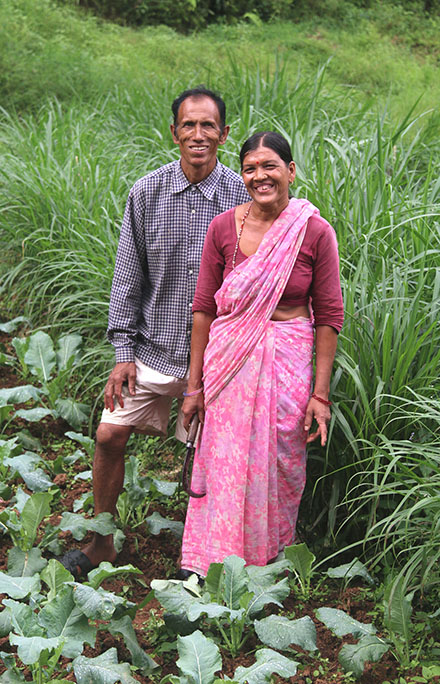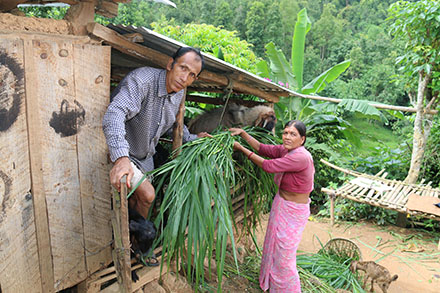
Gita Karki, 45, and her husband Hum Bahadur Karki, 53, from Mujung village, Palpa District are your typical Heifer project participants in Nepal. Neither of them have ever received any formal education in their lives. Coming from farming families, they practiced traditional farming and livestock raising techniques passed down from one generation to another. Farming had always been a way of subsistence and was not thought of as an enterprise until they became part of Heifer Nepal’s program.
Heifer Nepal began working with farmers in Mujung Village under the Strengthening Smallholders in the Livestock Value Chain project in 2012. Gita joined the Pashupati women’s self-help group (SHG) and received various capacity and income generation trainings. Then, the Karki family received six nanny goats and a breeding buck from Heifer.
“We use to raise [the goats] inside a closed room of our house,” Gita said. “Only after receiving improved animal management training from Heifer did I realize how wrong I was. We used NPR 40,000 (about $400) to build an improved shed. It has open play space for goats when they want fresh air and to bask in the sun, and for cool nights they have an indoor space with proper ventilation.”

The shed also has separate rooms for pregnant goats to protect them from getting kicked by other goats, which could cause miscarriage, and a separate room for bucks to prevent inbreeding that can decrease productivity of kid goats. With this small investment Gita and her husband have been able to double their income.
Along with increasing farmer’s income with goats, Heifer is concerned about well-being of the animals we place. Farmers are taught to treat their livestock in a humane way, and—like human beings—their productivity increases with the availability of a nutritious diet, regular vaccination, timely medication and a healthy living space.
Nepal is rich in forest resources; therefore, it is common for farmers to take advantage of this and collect fodder/forage for their livestock from nearby forests. This practice not only depletes forest resources but it also contributes little nutritional value and/or could be poisonous to the livestock. By training farmers like Gita and Hum Bahadur on fodder/forage plantation, along with providing seeds and saplings, Heifer ensures that raising livestock does not harm the environment. The couple has planted fodder/forage in the sloppy lands they own that cannot be used to cultivate crops or vegetables. This has promoted greenery in the environment and they have enough fodder/forage to last them the entire year.
The couple works together in their fields and is happy to have received Heifer’s support.
“I am very content with my life,” Hum says. “My family eats fresh vegetables and meat that we produce ourselves, and the greenery provides us with fresh air. We have nearly doubled our income from selling goats and vegetables. Life is good now.”
With a vision to increase their farm production, they reinvested their income from goats to expand their vegetable farm. This has been a wise business decision as they diversified their source of income and entered a lucrative market. This year alone, the family has sold goats and vegetables worth NPR 600,000 (about $6,000).
Since joining Heifer’s SHG, the Karki family has transformed from subsistence farmers into rural entrepreneurs. In their own little way, they are contributing to developing a self-reliant economy in Nepal despite its identity as an agricultural country heavily dependent on imports of food products from its neighboring countries. Farmers like Gita and Hum Bahadur are helping Nepal to achieve its goal of substituting imported meat and milk produce with that of local farms to create a resilient economy.
Photo and story by Alina Karki, Communication Officer, Heifer Nepal